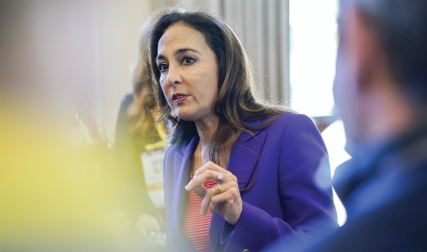Wonder Drug
Great article about Lisa Conte ’81, Tu’85, whose company seeks to develop drugs from rain forest plants [“Out of the Amazon,” May/June]! My grandfather was part of the team that developed the original birth control pill, which used progesterone that was synthesized from a wild yam found in Mexico. There are still many unknown plant-based substances that we can use to improve the human condition. Kudos to Conte for going out and searching for them!
Barnaby Dorfman, Tu’97
Seattle
Magic Show
The profile of the physics department’s lecture demonstrations manager Ralph Gibson [“A Body in Motion,” May/June] reminded me of the days of professor Francis Sears. Every “Physics 101” class was a magic show. Who could forget the time a stuffed monkey was suspended from the ceiling by an electromagnet as we spent the balance of the class constructing a spring-loaded gun to catch the monkey when it fell? All calculations were on the blackboard, using slide rules—and finally, at the bell, we caught that sucker about a foot off the floor! Three cheers for Gibson’s carrying on the tradition!
William F. Crouse ’61, Tu’62, Th’63
Hartland, Michigan
This may have been before Gibson’s time, but I will never forget professor John Kidder’s demonstration of the vectors and forces of rotational motion and angular momentum. First, he rapidly spun a heavily weighted bicycle wheel. Then Kidder, who was 6’3” or 6’4”, sat on a much-too-short piano stool. It slowly spun him and the bicycle wheel gyroscope around and around. Kidder tried to wrestle the spinning gyroscope from its intended path, but the gyroscope and its forces were the clear victors, and spin he did. Fifty years later, the image of the hopelessly rotating professor on the too-small stool is still unforgettable.
Going the extra mile to produce memorable lab demonstrations is a major component of what exceptional teaching is all about. I commend Gibson and the physics department for recognizing the significance of this important work.
Robert Bergesch ’70
Yarmouth, Maine
Gender Bender
Because sociology is the study of human behavior, it is puzzling why professor Janice McCabe (and so many other sociologists) feel they are qualified to make broad claims about a subject that is entirely biological, i.e., human sexual demarcation [“What’s Next,” May/June]. “There is a growing interest in blurring boundaries, especially as they relate to gender,” she declares, pretending not to know that “gender” means actual “sexual identity”—not the latest far-left political concept of no identity whatever.
It is true that politics are a major aspect of human behavior and, thus, the rightful study of sociologists. But it is depressing to see McCabe laud the aberrational behavior of a gender identity option under the delusional belief that that political construct is as real as XX and XY chromosomes no matter how fervently she and the rest of that sorry discipline wishes it were so.
Tom Holzel ’63
Litchfield, Connecticut
Strange Days
I’d like to thank Mark Nelson ’68 for writing “Out of This World” [May/June]. I had no idea Dartmouth had a connection to Biosphere 2. This surprised me because I’ve had a morbid fascination with Biosphere 2 since I visited it when I was 15. Its story is so bizarrely fascinating it seems fictional. On the one hand, so many of its participants were genuinely interested in artificial ecologies. On the other hand, the project seemed to attract more than its fair share of bizarros. I guess the lesson we should learn is that real-world systems are complicated and often defy simple explanations.
Max Fagin, Th’11
San Jose, California
In the months before the Biosphere 2 closure experiment began, I had a small contract to gather earthworms, my academic specialty, for that project. I did this in south and central Texas, because a savannah-like environment would be one of its ecosystems. On my worm-digging tour, I met a longtime associate of the Biosphere 2 organization. I knew scientists were helping plan Biosphere 2, but I was unprepared for his odd take on life on Earth. He said Biosphere 2 was all about getting ready to move to Mars when Earth starts to degrade badly. Many of those involved apparently believed the experiment was necessary because they thought that day was coming soon.
Sam James ’75
Fairfield, Iowa
Left and Wrong
Kudos to Stephan Lanfer ’66 for his right-on letter in the May/June issue about the political leanings of Dartmouth professors. Several years ago I became aware that 95 percent of Dartmouth professors were registered Democrats, a figure that’s in line with other Ivies as well as in higher education generally. The once great Dartmouth trademark—the liberal arts education—has been transformed into a liberal education.
The shift of our dear College has not gone unnoticed. More and more alums I meet express concerns that students are being given a biased education. They should be exposed to all views in an impartial way and then be allowed to make up their minds and not be spoon-fed by socialist faculty.
I have not donated to our alma mater in 10 years and have no intention of doing so as long as there is no grassroots effort within the College to change this course. The challenge for the College will be to decide if alums such as me represent a fringe, not to be taken seriously, or not.
Roger N. Gutner ’68
Scarborough, Maine
Out of Sight
I am the father, grandfather, or guardian of three Dartmouth students. All had good experiences at Dartmouth, but all of them at some point lived in substandard or deplorable housing. In my 50th-reunion book I wrote that “Undergraduate housing remains substandard even though it has been years since the problem was finally acknowledged.” I wrote that in 2011!
The College recently announced that a proposed new dorm will not be built [“Campus,” May/June]. President Hanlon said the reason was “We just can’t afford it.” A later paragraph said tuition is being raised to $53,496. This does not include substantial College expenses for each student.
A recent admissions application offered no place for prospective students to mention if they would be a first-, second-, or third-generation legacy. Although I joined the Bartlett Tower Society years ago, the lack of consideration for legacies and other admissions factors has reduced my annual giving to a normal level. There is a connection between lack of funds and alumni enthusiasm.
John H. Higgs ’56
Vero Beach, Florida
Am I the only one to be seriously annoyed by the statistics in the recent issue? I refer to the item that next year the cost of tuition, room, board, and fees will be $70,791! This followed another item that said financial aid budgeted for 2019 would increase 4.4 percent to $106 million.
I have felt for a long time that the cost of attending Dartmouth has been inflated to out-of-sight proportions. Giving gigantic amounts of financial aid to pay for such ever-increasing costs is, to a fair extent, taking money out of one pocket to put it into another pocket, since aid going to students is paid back to the College for room, board, and tuition.
Couldn’t a similar result be reached by deflating the students’ college expenses and decreasing the amount of financial aid? Or would that make Dartmouth appear to be less exclusive and cause a loss of status?
Sheldon M. Gisser ’60
Pepper Pike, Ohio
Trump Card
Television was not the only media disrupter of the recent presidential campaign, as the article “Party Crasher” [May/June] suggests. Long before the 2016 campaign, Trump honed his insatiable publicity-seeking skills learning how to imprint his face on a mass audience. During the campaign he reinforced this bond using bite-sized tweets he circulated whenever it suited him. Whether network and cable news coverage alone was a deciding disrupter does not, therefore, seem persuasive. Clearly, Trump already knew how to make free and low-cost media coverage work for him. I hate to admit it, but this strikes me as genius.
Ray Banks ’69
Ottawa, Ontario
“[Trump] has initially tried to do a lot of the stuff he promised to do, but it hasn’t gone very well for the guy,” because he’s been “hamstrung by a dysfunctional Republican Congress,” according to sociology professor John Campbell in his new book on the presidential campaign. Spoken like a true liberal Democrat!
Joel Lasky ’54
Dallas
Repent!
Robert Wool ’55 has been in New York too long. In his letter in the March/April issue, he writes that he is “appalled by those alums who contributed millions, not to the College, but to fixing up Moosilauke Lodge,” calling it “an expensive disgrace” [“Welcome to the Woods,” January/February]. He is as removed from Mother Dartmouth’s North Country heritage as Mother Earth from indoor urbanization. Access to the great outdoors saves us in places such as the magnificent new lodge. I would invite Robert to visit our Moosilauke Shangri-La to repent and be saved.
Michael Caldwell ’75
North Wolcott, Vermont
Head of the Class
Joe Gleason’s article [“Awakening,” March/April] rang up real memories for me. I, too, was a frightened freshman taking Professor Adams’ modern European history course a bit out of the normal schedule. Although Adams’ physical stature and eyesight may have declined through the years, his impact on me was the same as Mr. Gleason felt. This was a man who could put the student into history, not just recite facts about it.
Perhaps my most striking recollection of that course was his final lecture. It probably did not vary too much through the years. He lined out the challenges and threats of the world, summarizing the themes he had focused on. It was powerful. To close the lecture and the course, he shut his lecture notebook forcefully and said to the downcast class, “But, gentlemen, there is always hope.” With that, he strode out the door and was halfway down the hall before the class could revive and give him a standing ovation (a custom following the last meeting of classes in my day). He was a memorable and admirable force in education.
William Pharis Horton ’56
Madison, Wisconsin
Joe Gleason fondly recalls the “resonance and authority” of Adams’ “deep voice.” I read his tribute with a smile, remembering Adams’ account of a crucial battle during one of the Balkan wars. Serbian forces advanced over a hill, he told us, their band playing its national anthem. The Bulgarian foes listened, turned, and fled. Adams waited for our chuckles to die down and rumbled, “You may laugh. But have you ever heard the Serbian national anthem?”
James Winter ’47
Vancouver, British Columbia
I am the grandson of Professor Adams, and I just want to say how much I treasured this view of him from the classroom. I was too young when he died to truly experience or appreciate his scholarship. Thank you very much.
Ben Cash
Silver Spring, Maryland
Poetic Details
DAM recently contained a timely, well-written article on the controversy about the now-defunct plan to build a dormitory in College Park [“Campus,” March/April]. Although the passage about the statue of Robert Frost is given the same importance as comments about the Bema, Bartlett Tower, and Shattuck Observatory, it could have included more information about the commissioning of the statue, how it was paid for, and that the class of 1961 donated it in 1996.
Vic Rich ’61
Manhasset, New York
CORRECTION
In last issue’s “Continuing Ed,” a statue should have been identified as that of U.S. Supreme Court Chief Justice John Marshall. We regret the error.



